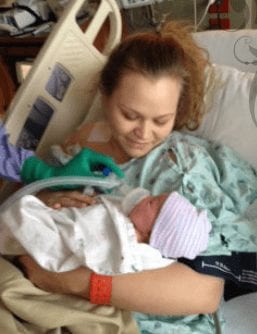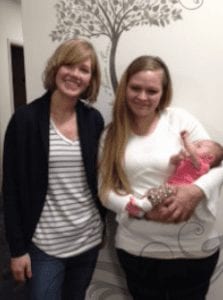
Fighting the Heroin Epidemic, Fighting for Clients
Nurse Michelle Krantz had a bad feeling when her client kept canceling appointments.
Cora and her husband, Eddie, both had a history of heroin addiction. With their first baby due in February, they were trying to stay clean. But on Jan. 8, Eddie, 28, relapsed, causing a serious car crash, overdosing and nearly dying before doctors revived him.
Three days later, Cora, 26, admitted that she, too, was using again. She landed back in jail in rural Sauk County north of Madison, Wis., where farms dot the landscape and heroin use has spiked dramatically as it has around the country.
Nurse-Family Partnership nurse Michelle faced a major challenge helping the couple transform themselves into parents.
“They are each other’s triggers. They use together, so that’s a huge risk factor to them. It’s been a battle.”
Still, the Nurse-Family Partnership supervisor and nurse got busy trying to plant some flowers in a rough patch of dirt.
She visited Cora weekly in jail, advocating for proper health care. When jail officials tried to bar Cora from contacting her husband, Michelle called meetings with jail and county officials and insisted they develop policies to help Cora succeed. Keeping Cora and Eddy apart was futile. Yes, the two had a bad past. But the promise of a new baby offered hope.
While Cora felt the sting of criticism from almost everyone, Michelle suspended judgment. “This baby is coming. It’s happening. This person is a human being who has made a mistake. What do we do to make it better now?” Michelle said.
Michelle helped Cora prepare for the birth and set healthy goals. Doctors gave Cora a drug to wean her from heroin. Meanwhile Eddie agreed to a strict drug court regimen including frequent testing and got back on Vivitrol, a drug that interrupts heroin highs and had helped Eddie stay clean in the past. Doctors prepared for a baby who may be experiencing withdrawal (Neonatal Abstinence Syndrome).
Emma Lynn arrived on Feb. 15 while Cora was still serving time. Jail protocol barred Cora from telling her husband, family or friends that she was in labor. The jail agreed, however, to tell Michelle. Normally nurses don’t attend births, but supervisors made an exception. Michelle arrived at the hospital at 4 a.m. and took pictures as Emma arrived at 8:01 a.m. In the past, jail officials had allowed new mothers just 12 hours of recovery. Michelle fought for two days so she could help Cora bond with Emma and start breastfeeding.
 When Cora returned to jail, hospital officials allowed Eddie to stay with his daughter as the infant detoxed. Along with coping with Neonatal Abstinence Syndrome, Emma had inhaled some meconium during the birth and was on oxygen at first. Still the outlook is good.
When Cora returned to jail, hospital officials allowed Eddie to stay with his daughter as the infant detoxed. Along with coping with Neonatal Abstinence Syndrome, Emma had inhaled some meconium during the birth and was on oxygen at first. Still the outlook is good.
“She’s the cutest baby,” Michelle said. “She’s relaxed and Eddie, who’s a big tough guy, loves dressing her in glitter pants. She’s doing very well. Her growth is good.” Ten days after Emma’s birth, Cora got out of jail, went through detox and like her husband, has subjected herself to strict supervision from the county’s drug court and regular doses of Vivitrol.
In the meantime, Michelle has received numerous referrals for pregnant women in the jail, who know her as “the nurse who fought for Cora.” Thanks to Michelle’s work, jail officials have adopted new policies.
“Nurse-Family Partnership (NFP) can do amazing things. NFP gave me the good base to advocate for my client and make system change. Every pregnant woman is going to have better care now because we started asking questions.”
Michelle knows her client could relapse. Both Eddie and Cora come from families that have struggled with drugs. Eddie was born while his own mother was in jail for cocaine use. Cora’s mother died recently from a heroin overdose and her brother faces criminal charges for supplying the lethal drugs.Despite tough odds, Michelle has learned to be the beacon of hope.
“Don’t give up on them because they’ve probably already given up on themselves,” she said. “I know this is not ideal. They don’t have a good track record. But this is the best chance they may ever have.”

